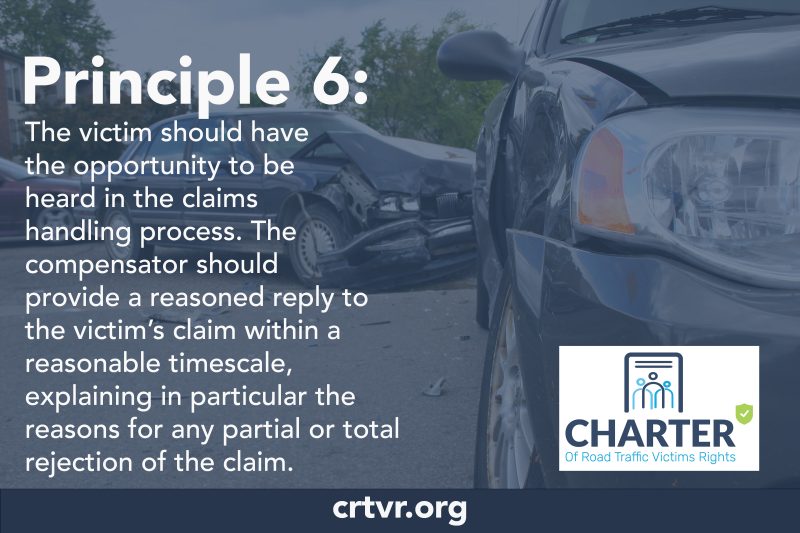Principle 6:
The victim should have the opportunity to be heard in the claims handling process. The compensator should provide a reasoned reply to the victim’s claim within a reasonable timescale, explaining in particular the reasons for any partial or total rejection of the claim.
The purpose behind Principle 6 of the Charter of Road Traffic Victims’ Rights is simple. It wants to encourage effective ‘listening’ and ‘responding’.
This goes towards the wider spirit of the Charter, treating each claim – and each victim – on an individual, humane basis.
In the past, there have been cases where claimants have received standardised responses that did not take into account the specifics of their accident or their claim. Rather their claim was bundled in with many others and received a “one size fits all” form of reply, which did not show sufficient care or respect to the needs of the victim.
Principle 6 of the Charter aims to prevent that type of situation arising.
Firstly, it wants to make sure the victim is ‘heard’ when they make their claim. That means they should be listened to. They should be given the opportunity to tell their story, to substantiate their claim, to report the damage that was done and to explain the compensation they are requesting.
Once the victim does that, the different aspects of their claim and the information provided should be carefully considered and examined.
Next, Principle 6 of the Charter wants to make sure responses provided are detailed and specific.
In preparing their reply, the compensating party should explain the position they are taking on the claim and their reasons for doing so. Responses shouldn’t ring hollow, or come across as a stock, boilerplate answer. It needs to be tailored to the information provided in each victim’s claim.
If a situation arises where liability is being partly denied, the reasons why should be clearly stated. All the different elements or arguments of the claim should receive a response. If liability is disputed, then the factual or legal grounds why that decision was made should be included. This enables the victim to understand the compensating party’s position and to further argue their case if counter arguments or additional evidence can be provided.
Principle 6 of the Charter also wants to make sure that responses are issued in a reasonably prompt manner. The compensating party can’t take forever to consider a victim’s claim. They should act on it swiftly, diligently evaluating the specifics and then providing their considered response.
The exact timescale involved will obviously need to take account for the complexity of the claim and the level of damage. Afterall, the workload of compensating parties can be considerable, and they have to have sufficient time to evaluate whatever the claim involves. Equally, victims can’t be left waiting eternally.
Within the European Economic Area, the objective time period foreseen under the Fourth Motor Insurance Directive is to ensure responses are issued within 3 months of the submission of the claim. This seems like a reasonable and valuable benchmark.
How a victim’s claim is handled is central to the Charter of Road Traffic Victims. Principle 6 seeks to ensure the compensating party listens to victim, allows them to tell their story and then efficiently replies to the victim in an informative manner. It wishes to cultivate a humane and real dialogue, ensuring the victim knows their claim is being heard and treated seriously.


